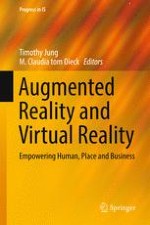2018 | Supplement | Buchkapitel
Augmented Reality Adoption by Tourism Product and Service Consumers: Some Empirical Findings
verfasst von : Azizul Hassan, Erdogan Ekiz, Sumesh S. Dadwal, Geoff Lancaster
Erschienen in: Augmented Reality and Virtual Reality
Aktivieren Sie unsere intelligente Suche, um passende Fachinhalte oder Patente zu finden.
Wählen Sie Textabschnitte aus um mit Künstlicher Intelligenz passenden Patente zu finden. powered by
Markieren Sie Textabschnitte, um KI-gestützt weitere passende Inhalte zu finden. powered by
